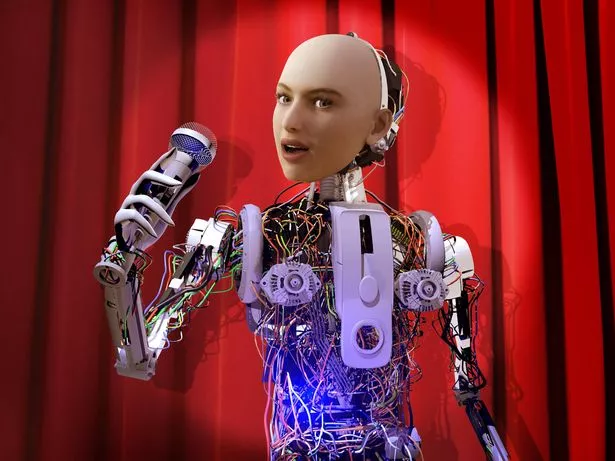An AI walks into a bar... Can artificial intelligence be genuinely funny?

We asked a professional comedian to deliver some jokes written by artificial intelligence on stage. What happened reveals a lot about just how much machines understand the very human sense of humor.
Karen Hobbs was more nervous than usual before this particular gig. A well-known circuit comedian, she's accustomed to the UK's often bruising stand-up comedy scene. It's eclectic, unpredictable, and famously short on pity-laughs. Hobbs has tackled some of the most unforgiving rooms in Britain, from major London theatres to the back rooms of rural pubs. She has even triumphed within the dreaded competition circuit, in which a merciless audience votes in a gladiatorial popularity contest for the funniest gags.
But this Thursday night in late June, above the Covent Garden Social Club bar in Central London, Hobbs was about to attempt something new. She would take to the stage equipped not with her usual material, but with a stand-up set written for her by the AI platform ChatGPT. Most daunting of all, she would follow three comedians doing their actual, human material.
In the space of two years, the OpenAI-developed chatbot has gone from a niche, techy curiosity to the first tool to truly bring AI to the masses. As AI entered the mainstream, its already terrorized teachers and universities, stole jobs from freelance copywriters and even flooded social media with low-effort and sometimes unsettling content. Some experts warn of a potential AI-driven apocalypse as machines improve to the point they can truly outperform human beings, a hypothetical technology known as "artificial general intelligence" (AGI). Others doubt AI will ever even approach that point.
But when it comes to art, it's debatable whether or not generative AI, by its nature, can be truly creative. Large language models (LLMs) like ChatGPT work by processing billions of lines of text scraped from the internet and other sources, unpacking the patterns and relationships between words and sentences. Using that data, AI generates responses that are, statistically, the most likely answer to a given prompt. That means these AI tools can only replicate information that already exists in some form, though it can result in never-before-seen combinations of ideas. Whether that counts as creativity is a philosophical question, one currently without a satisfying answer.
Can a robot be funny?
To understand whether AI tools can really demonstrate humor, Alison Powell, an associate professor of communications at the London School of Economics who studies AI's influence on our media, insists that we must first ask ourselves a question: "How do jokes work?" Powell herself cut her teeth in improv comedy, a scene that is arguably more brutal still than the world of stand-up. In improv, there is no room for planning, and the comedian has nothing but an instinctive response to an audience prompt.
You might assume comedians have little to worry about if AI is so fundamentally derivative, but there are major secondary risks for creatives. "Comedians should be concerned about data theft and regurgitation, because many of the generative AI tools, especially ChatGPT, are being trained on content on the internet," Powell says. "This means people's writing and creativity are acquired from the internet without permission."





